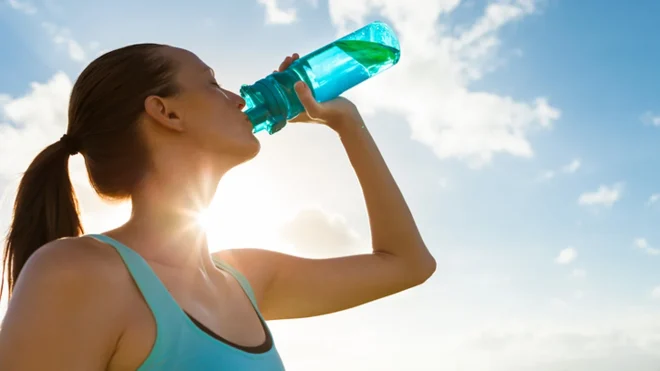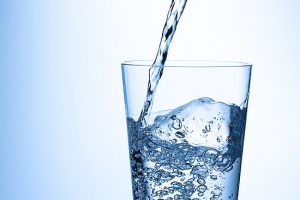
How much water should I drink every day?
Staying hydrated has many health benefits, but drinking too much can be bad news. Wondering how much water you should drink every day? We have the answer.
Water is important because it helps with many bodily functions, including maintaining electrolytes, improving metabolism, eliminating toxins from the body through urination, and lowering body temperature. It is generally recommended to drink eight glasses of water a day to maintain adequate fluid levels in the body. This may work for some, but it is not for everyone! So how much water should you drink a day?

What factors affect a person’s water needs?
There are many factors that go into how much water you should drink. People who live in hot places or exercise regularly need to drink more water. Here are some things to consider before deciding how much water you need:
- Muscle tissue contain more water than fatty tissue. People with more muscle mass need more water.
- Larger people generally require more water to maintain adequate hydration.
- Physical activity causes water loss through sweating and breathing, so it is necessary to drink more water.
- Higher intensity and longer duration exercise will increase water requirement.
- Hot weather and humidity increase sweating, which means more water is needed.
- High altitude can increase respiration and urination, both of which increase water needs.
- Fever, diarrhea, and vomiting can lead to dehydration and the need to drink more water.
- Eating too much salt or too much protein can cause the body to need more water.
- Pregnant women and breastfeeding women need more fluids to support babies and milk.
How much water should you drink each day?
According to the NHS, people should try to drink six to eight glasses of water a day, including unsweetened drinks, including tea and coffee. However, you may need to drink more if you are breastfeeding or pregnant, live in hot and humid areas, are involved in prolonged physical activity or are recovering from illness. Basically, people should drink enough water throughout the day to keep their urine clear and pale yellow.
It’s important to make a personal decision and listen to your body’s signals to determine what amount of water is right for you. You may need to drink more or less than eight glasses of water a day. A 2022 study published in the journal Science found that drinking eight glasses of water a day may be too much. Researchers found that drinking two liters of water a day is more than most people need. About half of your daily water intake comes from food, so scientists estimate that people only need 1.5 to 1.8 liters of water a day.
How to meet your water needs
The amount of water you need daily may vary, but you can do the following to meet your water needs:
1. Keep a water bottle
If you are outside, keep a bottle of water with you every day and encourage you to drink water regularly. Try not to drink bottled water as they contain toxic plastic bits. Use a stainless steel water bottle instead.
2. Set reminders
You may be busy with your work or family. In the middle of all this, you may forget to drink. Use an alarm clock or app on your phone to remind you to drink water regularly to prevent dehydration.
3. Eat more hydrating foods
Incorporating foods with high water content into your diet, such as cucumbers, oranges, grapefruits, strawberries, celery, and lettuce. Soups and broths are also good choices because they not only add water but also nutrients.
4. Infused water
Enhance the flavor of plain water by adding a few fruits, such as lemon, cherry, lime, or strawberry. You can add cucumber and herbs like mint and basil to make your water more appealing.
5. Herbal tea
Herbal tea is hydrating and delicious. This tea increases your water intake without added calories or caffeine. You can drink chamomile tea, mint tea or hibiscus tea to meet your hydration needs.
6. Milk
Cow’s milk and fortified milks like almond, whole milk, or oat milk provide moisture. They also provide important nutrients like calcium and vitamin D, which are essential for strong bones.
Experts also recommend limiting your intake of caffeine and alcohol, as both have diuretic effects and can cause dehydration if consumed in excess.

Consequences of hydration
Adequate hydration can improve physical performance by maintaining energy levels and reducing fatigue. Experts say it can improve concentration and alertness. Water helps maintain regular bowel movements and prevents constipation. Drinking water is beneficial, but drinking too much can cause problems:
- Drinking too much water can lower the amount of sodium in your blood, causing hyponatremia, which can be life-threatening.
- Too much water puts more stress on the kidneys, which prevents them from excreting excess water.
- Drinking too much water can upset the electrolyte balance in the body and affect the nerves and muscles.
- Too much water causes swelling of cells, possibly causing swelling in the brain (cerebral edema) and other tissues.
- Too much water can cause nausea and vomiting.
Individual water needs vary depending on many factors, including your health and where you live. Stay hydrated, listen to your body’s signals and adjust your water intake accordingly.
